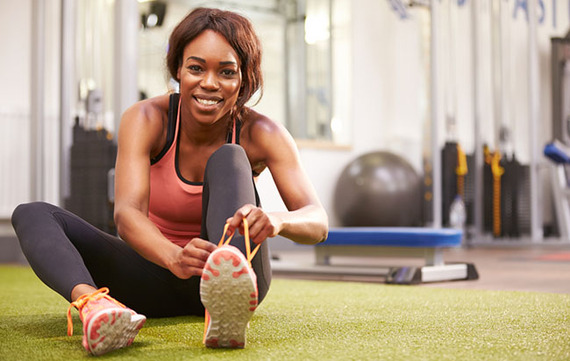By Jennifer Blake
"Thunder thighs." "Bat wings." "Chicken legs." These are terms many women toss around in a seemingly light-hearted manner when describing their bodies. Whether the tone is derisive or self-deprecating, the underlying message of what they're saying is the same: They're having a difficult time loving and embracing what they see in the mirror.
As a personal trainer for the past seven years, I have worked with hundreds of women -- and men, too -- who represent a wide sample of the various shapes, sizes, and colors and that make up the human collective.
Nine times out of 10, when a woman walks through the door of the gym and tells me what she's hoping to achieve, her goal is aesthetic: "I want to be thinner." "I want to tone up." "I want Michelle Obama arms."
(Hot tip -- to get Michelle Obama's arms, you'd have to be born as Michelle Obama, that lucky lady.)
Often, the prospective client will viciously grab her outer thighs, shake them, and say, "I want to get rid of these thunder thighs!" Or her arms will protectively cross over her middle, and she'll say, "I just need to get rid of this jelly donut on my stomach."
RELATED: How to Be Nicer... To Yourself
A big part of my job as a trainer isn't just to show a client what her body is capable of; it's to help her change the words she uses to describe her body. Why? Because while bodies have incredible power and potential, so do the words we ascribe to them.
Once a woman gets a sense of what her body can do, she also realizes she is more than simply a sum of her individual parts -- and the conversation about her physique inevitably changes as a result.
I've seen this play out countless times at the gym and in my community of like-minded women. A fellow coach at my gym, The Movement Minneapolis, had this to say: "I used to Google ways I could shrink my thick knees and cankles. Now, I know this thickness is protecting me when I squat with a heavy bar on my back." The acceptance and appreciation she now has for her body has altered the lens through which she sees herself.
The point is that, often, when you see your body responding to a physical challenge by getting stronger, faster, and more athletic, the term "thunder thighs" doesn't sting so much.
Hanne Blank, author of "The Unapologetic Fat Girl's Guide to Exercise and Other Incendiary Acts," has said, "There's no wrong way to have a body." We can, however, do a better job with the way we speak about them. And referring to our bodies with language that reflects more appreciation and kindness is a change I believe we can all get on board with.
More from Women's Health:
17 Women of Different Shapes and Sizes Proudly Display Their Body Weight
9 Legit Reasons You Should Try Going Topless at the Gym
10 Moves That Will Make You a Stronger, Faster Runner
Also on HuffPost:

